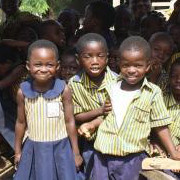
Ghana (MNN) — Sometimes, being a kid can be dangerous — especially in America, where 300,000 minors are enslaved in the sex trade and 90% of kids are at risk of being trafficked.
In Uganda, you might be forced to either kill or be killed as a child soldier.
And in India? You could become a prostitute at the ripe age of seven, have your organs ripped out and sold on the black market, or you might just simply disappear.
Every Child Ministries says West Africa is one of the most active places in the world for child slavery. One area of focus for ECM is shrine slavery. There are several different kinds of ritual servitude, but one of the most well-known forms is called trokosi. Virgin daughters–usually between the ages of 8 and 15, but sometimes as young as 4–are sold to temple priests as appeasement for a family member's alleged sin.
These girls become the property of the temple priest, subject to his every demand — whether for sexual pleasure or back-breaking labor. At the same time, shrine slaves are denied education and oftentimes food.
Shrine slaves can be found in Ghana, Togo, Beni,n and southwestern Nigeria. Although Ghana outlawed the practice in 1998, ECM says it continues for two primary reasons. Number one, the government doesn't want to interfere with the customs of the people. Number two, many people fear they'll be cursed if they stand against the priests of the shrine.
"Gradually, it's going down; however, there still are many who need help," says ECM co-founder and originator of ECM's anti-slavery initiative, Lorella Rouster.
"As long as there's one still in slavery, we are dedicated to trying to help them."
ECM rescues temple slaves in Ghana and gives them a chance for new life. Over the past 12 years, ECM has liberated 500 trokosi slaves and 2,000 slave children. In June, the ministry purchased land along the Ghana-Togo border for their rehabilitation center.
"We've been trying to do those things already, but our ability to do them has been somewhat limited by not having an adequate place to do them in," Rouster explains. "Now that we have a place of our own we'll be able to greatly expand that program."
From late January 2013 to early February, a construction team will re-roof the buildings and make some repairs. Two volunteers are still needed for this trip; you can sign up here.
When the ECM rehab center is up and running, former slaves will have access to vocational and life skill classes, counseling, and Bible studies. Rouster said ECM offers these programs to survivors "so that they can find a way to support themselves and their families, and not just be receiving but contributing members of society."
"In July, we'll be taking a group of women, and we'll be teaching some craft skills, some Bible study skills…and we'll be giving some additional training to the workers," Rouster continued. "We hope to have [the center] open in July 2013."
Their efforts will have a multiplying effect on bringing others to Christ.
"This is really strategic for the Gospel," Rouster said. "We hope that we can establish some of the survivors in the Gospel so firmly that they will be equipped and motivated to reach out to others who are still trapped in that spiritual slavery of idolatry, as well as physical slavery.
"There might be ways that [workers] could help to free them and share the Gospel with them," Rouster explained. "That's our ultimate goal. Of course, a lot of work needs to be done in the meantime to get to that place."
One donor has agreed to match every dollar up to $7,000, to help buy a van for the center. Click here to help build the rehabilitation center.
